Merchant of Venice Act 3, Scene 2 Modern English Translation Meaning Annotations – ICSE Class 10 & 9 English
EnglishMathsPhysicsChemistryBiology
ICSE SolutionsSelina ICSE SolutionsML Aggarwal Solutions
Original Text
Act III Scene II
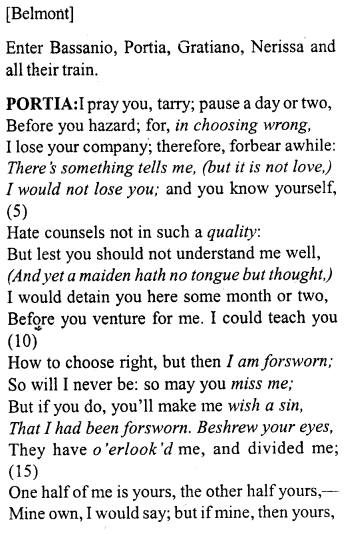
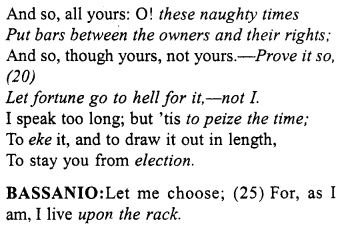
Modern English Reading
Act III Scene II
PORTIA : Please wait; wait a day or two before you choose; because, in choosing wrong, I lose your company; so wait a while. I have a feeling, but it is not love, that I would not lose you; and you yourself don’t hate premonitions like that. But for fear that you don’t understand me well,—A and still a maiden only has thought for a voice,—I would keep you here for a month or two before you gamble for me. I could teach you how to choose right, but then I’m breaking my oath; I’ll never do that; you may not win me; and if you don’t, you’ll make me wish I had sinned, that I had broken my oath. Curse your eyes, they have looked me over and divided me: One half of me is yours, the other half is also yours, my own love, I would say; but if my love, then yours, and so everything yours. Oh! these wicked times put up bars between the owners and their rights; and so, though I am yours, I am not yours. Prove it like that, Let fortune come on hell for it, not me. I’m talking too long, but it’s to balance the time, To lengthen it, and to draw it out in length, To keep you from choosing.
BASSANIO : Let me choose;Because as I am, I live in torture.
Word Meaning With Annotation
In choosing wrong : in case you should choose wrongly. There’s something tells me, (but it is not love,) I would not lose you : the words are deliberately vague. Portia wishes to tell Bassanio that she wants him to be with her but maidenly modesty prevents her from declaring actual love for him. So she hints at the truth, saying, “A certain reeling, I will not say it is love- prompts me in wanting you to remain.” She neither confesses her love nor denies it. quality : manner, and yet a maiden hath no tongue but thought : a maiden is prohibited by modesty from telling her love; she may only think of it. I am forsworn: I would have committed a breach of faith, miss me : lose me by making the wrong choice, wish a sin, that I had been forsworn : she will then wish that she had committed a sin, and had informed Bassanio which casket was the right one to choose. Beshrew your eyes : means “Curse you!” though the expression is always used in a humorous and light-hearted manner, where a curse is not intended, overlook’d : the evil eye. these naughty times put bars between the owners and their rights : “the evil times we live in put obstacles between men and their rightful property.” Portia refers to the compulsory choice between the caskets, as a barrier to be surmounted before Bassanio can possess himself of what is already his own by right, herself. There is also a reference to the artificial barriers which society raises between lovers of high position. Prove it so, let fortune go to hell for it, not I : “If such should prove to be the case, my ill-fortune be punished, and not myself.” Portia insinuates that if Bassanio’s choice between the caskets should be wrong, her love for him will make her defy the decision. In this case, ill-fortune should receive the punishment of hell-fire for such a breach of her oath, and not herself, to peize the time : to “peize” anything meant to retard it by hanging weights upon it. Cp. Richard III. eke : prolong; augment, election : choice; selection, upon the rack : “in a state of torture.” The rack was an instrument something like a bed; the victim was stretched upon it, and his wrists and ankles attached to the four comers. The levers stretched him out violently, leaving in great agony. It was used to force confessions from a prisoner, and is still used as a metaphor for intense pain.
Original Text
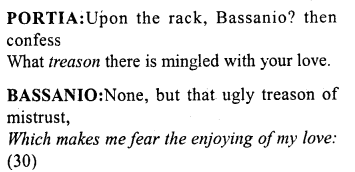
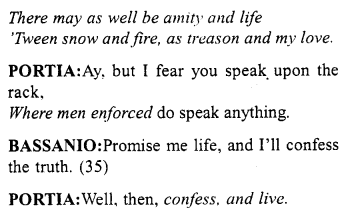
Modern English Reading
PORTIA : In torture, Bassanio! Then confess what evil is there mingled with your love.
BASSANIO : None but that Ugly evil of mistrust, which makes me fear the enjoying of my love: there may as well be friendship and life between snow and fire as evil and my love.
PORTIA : Yes, but I’m afraid you speak out of torture, where men will say anything.
BASSANIO : If you promise to grant me my life, I would confess the truth.
PORTIA : Well then, confess and live.
Word Meaning With Annotation
Treason : disloyalty to State or ruler, which was often punished by torture in the middle ages, which makes me fear the enjoying of my love : which makes me fear that I shall never enjoy my love, there may as well be amity and life, ’Tween snow and fire, as treason and my love : there could be agreement between snow and fire as easily as between treason and my love, when men enforced : the torture of the rack was so extreme that men subjected to it would gladly confess any crime for the sake of a brief respite, confess and live : if you confess the truth, you shall (like the prisoner on the rack) be given a promise of life.
Original Text
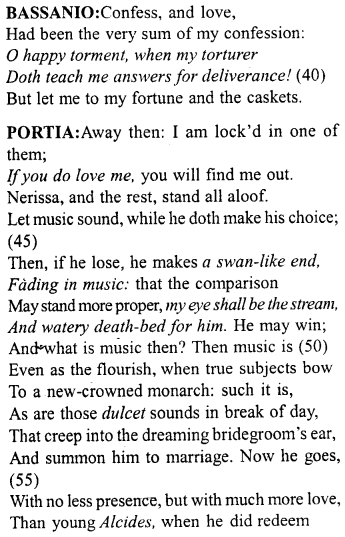
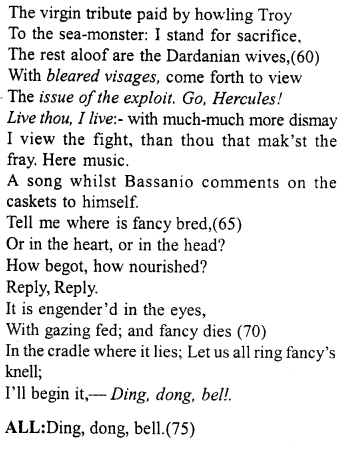
Modern English Reading
BASSANIO : “Confess” and “love” Have been the very sum of my confession: Oh, happy torment, when my torture Teaches me answers for escape from evil! But let me go to my fortune and the chests.
PORTIA : Away, then! I am locked in one of them: If you do love me, you will find me out. Nerissa and the rest, stand away; Let music sound while he makes his choice; Then, if he loses, he will die as a swan, Fading in music: so that the comparison may be extended, my eyes shall be the stream and watery deathbed for him. He may win; and what is music then? Then music is sounds as the trumpets when true subjects bow to a new-crowned king; music is those sweet sounds at sunrise that creep into the dreaming bridegroom’s ear and summon him to marriage. Now he goes, with no less confidence, but with much more love, than young Alcides went to redeem the sacrifice of young women made by howling Troy to the sea-monster: I stand for sacrifice; The rest aloof are the Dardanian wives, with tear-stained faces coming out to view the outcome of the event. Go, Hercules! If you live, I live. I view the fight with much, much more sadness than you that are fighting. Tell me where is fancy bred, in the heart or in the head, How begot, how nourished? Answer; answer. It is born in the eyes, Fed with gazing; and fancy dies in the cradle where it lies. Let’s all ring fancy’s knelhl’ll begin it.— Ding, dong, bell.
Word Meaning With Annotation
O happy torment, when my torturer, Doth teach me answers for deliverance : still the metaphor of the rack. Bassanio says that his torturer, Portia, who is keeping him in an agony of suspense, is a kindly torturer, since she suggests the answer which will have the effect of releasing him from the ordeal! if you do love me : Portia seems to think that the test of the casket is indeed a test of true love, a swan-like end, fading in music : An old superstition that the swan, usually mute, sings a beautiful song just before its death, my eye shall be the stream, and watery death-bed for him : Portia says to him that, just as the stream on which it floats is the death-bed of the dying swan, so her tear-filled eyes will be the death-bed of Bassanio if he fails, dulcet: from Latin dulcis, sweet. Alcides : another name for Hercules; Cp. II, I, 35. bleared visages : tear-stained faces, issue of the exploit : the result of his achievement. Go, Hercules : she fancifully addresses Bassanio as her Hercules. Live thou, I live : “if you are successful, I shall live in happiness.” Ding dong bell : an imitation of the sound of a church bell, which is rung when any one has died.
Original Text
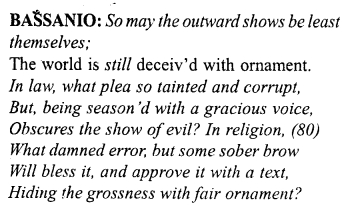
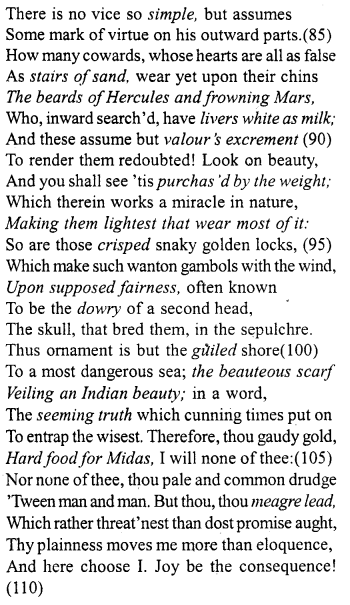
Modern English Reading
BASSANIO : These chests may not be what they seem outside : The world is still tricked by ornament. In law, what plea is so tainted and corrupt that, being delivered with a gracious voice, obscures the evil underneath? In religion, What damned error is there that some sober face will bless it, and approve it with a text, hiding the grossness with a beautiful ornament? There if no vice so simple that it takes on some mark of virtue on outside. How many cowards, whose hearts are all as false as stairs of sand, still wear the beards of Hercules and frowning Mars on their chins, who, if searched inside, would have livers as white as milk; and the only thing these men do to look fearful is to put on velvet clothes look on beauty and you shall see it’s bought by the pound: which works a miracle in nature, making them who wear most of it look the lightest: So are those crisp, snaky, golden locks which are playing games with the wind, on made-up beauty, often known actually to be wigs of human hair, the head that bred them is in the tomb. Thus decoration is only the deceived shore to a most dangerous sea; the beautiful scarf Veiling an Indian beauty; in a word, the seeming truth which skillful times dress in to fool the’ wisest men. So, you gaudy gold, Hard food for Midas, I don’t anything from you; and not from you either, you pale and common exchange between man and man: but you, you lowly lead, which threatens rather than promises anything, your plainness moves me more than any speech, and I choose you: joy be the result!
Word Meaning With Annotation
So may he the outward shows he least themselves : The sense here is that the outward appearances of things may differ greatly from their real natures, still: continually; always. In law, what plea so tainted and corrupt, but, being season’d with p gracious voice, obscures the show of evil: Bassanio reflects that a dishonest case in law may be made to appear just, by the eloquence of a clever lawyer. In religion, what damned error, but some sober brow will bless it, and approve it with a text, hiding the grossness with fair ornament : similarly in religion it is possible for some wicked doctrine to appear fair and true if expounded by a serious priest, and concluded by a text from the Bible, simple : plain; unmistakable, stairs of sand : these would indeed be very untrustworthy and unreliable steps to walk upon, the beards of Hercules and frowning Mars : men. who are cowards, yet wear beards like Hercules, the God of strength, and wear a frowning expression which might suit Mars, the god of war.
livers white as milk : a man having a brave heart, as if the heart was the seat of physical courage, valour’s excrement : an outward growth as a beard is. purchas’d by the weight : the beautiful colours and complexion of women’s faces have been bought (in the form of cosmetics) in chemist’s shops. Moreover, there is the case of beautiful hair, which is often an artificial wig which has been purchased, making them lightest that wear most of it : Women who wear the greatest amount of artificial aids to beauty are the lightest in morals whereas we would expect to find them heaviest, crisped : curled.upon supposed fairness : upon the head of a lady who has a reputation for beauty, undeserved because the hair is not really her own, but has been cut from the head of some other person who is now dead and in the grave, dowry : possession gulled : a shore which is dangerous to shipping.
He beauteous scarf Veiling an Indian beauty: thought of the negroes of the West Indies as “Indians”. The idea here is that of a beautiful cloth covering the thick lips and flat nose of a negress, a fair outward appearance concealing ugliness, seeming truth : a false appearance of truth, hard food for Midas : Midas was an ancient king who was allowed to ask a certain favour from the gods. Midas was very avaricious and asked that whatever he touched might turn to gold. His request was granted. Then he found that when he attempted to eat, his food was at once turned to gold. So he was in danger of starving to death, and had to pray to the gods to withdraw their gift, meagre lead: unattractive lead, in comparison with gold and silver.
Original Text
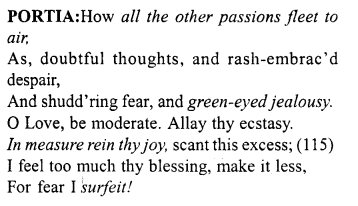
Modern English Reading
PORTIA : How all the other passions fly to the air, as doubtful thoughts, and rash-embraced despair, And shuddering fear, and green-eyed jealousy! Oh, love! behave; hold back your thrills; Be happy slowly; limit this excess; I feel your blessing too much; make it less, Because I’m afraid of having too much joy!
Word Meaning With Annotation
All the other passions fleet to air : how every passion except love vanishes like thin air. green-eyed jealousy : jealousy is personified here, and said to be a monster with green eyes. In measure rein the joy : “scatter down the joy.” surfeit : to sicken of a thing from having too much of it.
Original Text
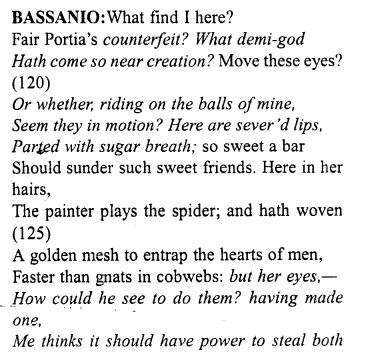
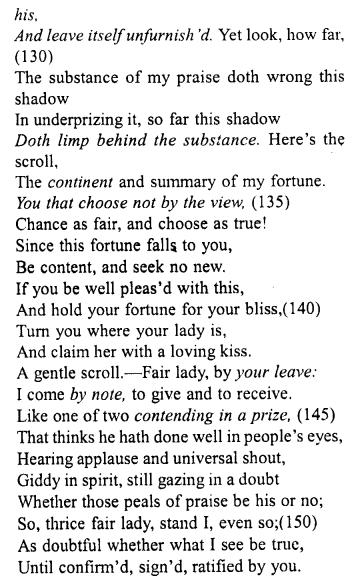
Modern English Reading
BASSANIO : What do I find here? Beautiful Portia’s picture! What minor god has come so near to making a woman? Do these eyes move? Or do they seem to be moving because they are riding on my eyeballs? Here are parted lips, Parted with sugar breath; so sweet a bar should tear such sweet friends apart. Here a he painter plays the spider in her hair, and has woven a golden mesh to capture the hearts of men faster than gnats are caught in cobwebs: but her eyes! How could he see to do them? Having made one eye, I think it should have power to steal both his, and leave itself poor: yet look, how far the body of my praise insults this shadow by valuing it less, so far this shadow limps behind ‘the substance. Here’s the scroll, The world and summary of my luck.” You that choose not by looks, Gamble as fair and choose as true! Since this fortune falls to you, be content and seek no other new one. If you are well pleased with this, and hold your fortune for your bliss, turn to where your lady is and claim her with a loving kiss.” A gentle scroll. Beautiful lady, excuse me; I come off to the side, to give and to receive. Like one of two contenders for a prize, that thinks he has done well in people’s eyes, hearing Applause and universal shout, Giddy in spirit, still gazing in a doubt whether those peals of praise are his or not; So, three times beautiful lady, I stand I, even like this, as doubtful of whether what I see is true, until it is confirmed, signed, and ratified by you.
Word Meaning With Annotation
Counterfeit : something made exactly the same as another, what demi-god hath come so near creation : a demi-god is a half-divine person. Bassanio says that the portrait is so near to being alive that the artist has almost created life, or whether, riding on the balls of mine, seem they in motion: or is it the fact that their image is taken up by my own eyeballs, which seem to impart motion to them?here are sever’d lips, parted with sugar breath : her lips are slightly parted by the sweet perfumed breath which passes in and out.
but her eyes, how could he see to do them? having made one, me thinks it stfbuld have power to steal both his, and leave itself unfurnish’d : says that it surprises him that the painter was able to finish the second eye of the portrait, because the beauty of the first eye should have absolutely dazzled the artist, so that he could not see to complete the second one. Thus the first should have been left without its companion eye (unfurnish’d = unaccompanied), doth limp behind the substance : moves like a lame person (limp) in an unsuccessful effort to keep up with the original, continent: that which contains; the container, you that choose not by the view : the whole principle on which the choice of the caskets is founded is expressed in this line, namely that men should not choose by outward appearances, but should look deeply for the real meaning of things, by note : according to this instruction, your leave : kissing her. contending in a prize : the simile is that of two wrestlers, or similar athletes, competing for a prize.
Original Text
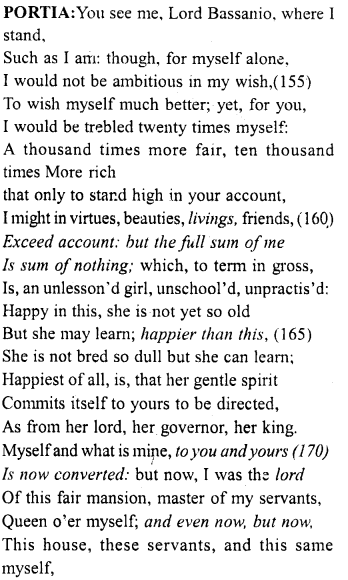
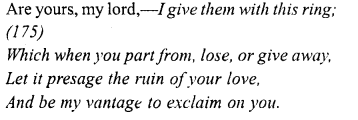
Modern English Reading
PORTIA : You see me, Lord Bassanio, where I stand, such as I am: though for myself alone i would not be ambitious in my wish to wish myself much better luck. Still, for you, I would be three times twenty times myself, a thousand times more beautiful, ten thousand times more rich; If only to stand high in your account, I might exceed making a count of virtues, beauties, livings, friends. But the full sum of me is the sum of something which, in general, is an un lessoned girl, unschooled, unpracticed; happy in this state, she is not too old to learn; happier than this state, She is not bom so dull that she cannot learn; Happiest of all is that her gentle spirit commits itself to you to be directed, as by her lord, her governor, her king. I and what is mine is now converted to you and yours. However, now I was the lord of this beautiful mansion, master of my servants, Queen over myself; and even now, but now,This house, these servants, and I, are yours – my lord’s. I give them with this ring, which, if you part from it, lose it, or give it away, let it predict the ruin of your love, and be my opportunity to cry out against you.
Word Meaning With Annotation
Livings : property; possessions, exceed account : surpass all reckoning, but the full sum of me, is sum of nothing : but the sum total of all my virtues amounts actually to nothing at all. happier than this : and a happier circumstance than that is etc. to you and yours is now converted : now pass to you, and become part of your property, lord : used as “owner” without regard to sex. and even now, but now : and just now, at this very moment. I give them with this ring; which when you part from, lose, or give away, let it presage the ruin of your love, and be my vantage to exclaim on you : this gift of the ring, which looks no more than a pretty action on Portia’s part, is really the commencement of an important subsidiary action in the latter stages of the play, presage : fore tell, and be my vantage to exclaim on you : and then it will be my opportunity to scold you.
Original Text
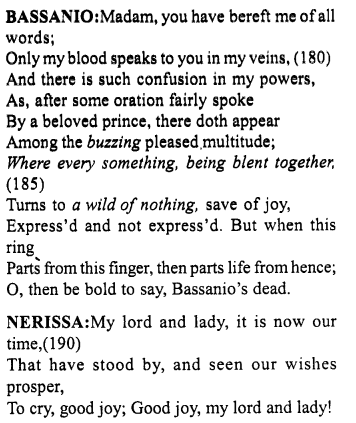
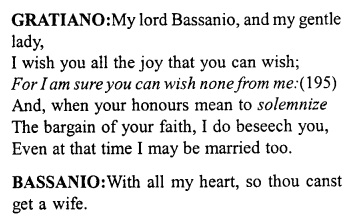
Modern English Reading
BASSANIO : Madam, you have made me speechless, only my blood in my veins speaks to you, and I am so confused Just as there appears buzzing among a happy crowd after a well given speech by a beloved prince; where every piece, blended together, turns to something wild, expressed and not expressed, except for joy. But when this ring parts from this finger, then life parts from my body; Oh! Then you can be strong and say, “Bassanio’s dead.”
NERISSA : My lord and lady, now it’s our turn, o cry, “Good joy,” We who have stood by and seen our wishes for you come true, Good joy, my lord and lady!
GRATIANO : My Lord Bassanio, and my gentle lady, I wish you all the joy that you can wish for yourselves; Because I am sure you can’t wish any from me; and when you two mean to make the bargain of your vows solemn, please, even then, let me be married too.
BASSANIO : With all my heart, if you can get a wife.
Word Meaning With Annotation
Buzzing : murmuring, where every something, being blent together : where all individual sounds being mingled, a wild of nothing : a wild confusion of sound, expressing nothing, for I am sure you can wish none from me : Gratiano has wished Bassanio all the joy he may desire, and adds “I may safety do this, for I am sure you are not likely to desire anything that will be taken from me” i.e. there is no fear of your wanting Nerissa, who is mine, solemnize : celebrate or confirm solemnly.
Original Text
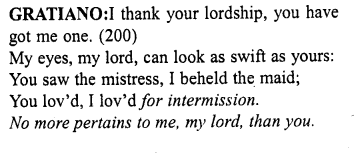

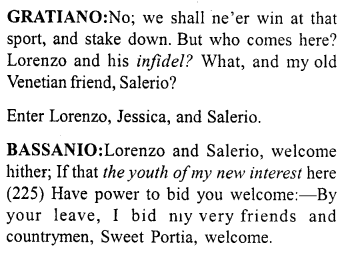
Modern English Reading
GRATIANO : I thank you sir, you have gotten me one. My eyes, my lord, can look as quickly as yours: You saw the mistress, I saw the maid ; You loved, I loved, because a rest doesn’t pertain any more to me, my lord, than to you. Your fortune stood on the chests there, and so did mine, as it works out; Because courting here until I worked up a sweat, and swearing promises until my mouth was dry with oaths of love, at last, if her promise lasts, I got a promise of this beautiful one here to have her love, provided that you were lucky enough to get her mistress.
PORTIA : Is this true, Nerissa?
NERISSA : Madam, it is, as long as you are pleased with the rest of it.
BASSANIO : And you, Gratiano, are you sincere?
GRATIANO : Yes, in faith, my lord.
BASSANIO : Our feast shall be very honored by your marriage.
GRATIANO : We’ll bet them who has the first . boy for a thousand dollars.
NERISSA : What! Bet?
GRATIANO : No; we shall never win a bet at that sport. But who comes here? Lorenzo and his infidel? What, and my old Venetian friend, Salanio!
Enter Lorenzo, Jessica, and Salerio.
BASSANIO : Lorenzo and Salanio, welcome here, If my engagement just now gives me the power to bid you welcome. Excuse me, I bid my very friends and countrymen, welcome, sweet Portia.
Word Meaning With Annotation
For intermission, no more pertains to me, my lord, than you : for delay in seizing an opportunity is no more a fault in my nature than it is in yours, as the matter fall : as things turn out. for wooing here, until I sweat again : Gratiano says that his love suit was hard and difficult matter, and compares it to bard labour Which makes a man perspire, swearing : making declarations of his love, if promise last : if her promise still holds good. Achieved : unhold. Infidel : “not faithful” i.e., the one who is not a believer in a particular religion; an unbeliever. Applied to Jessica because she is not a Christian, the youth of my new interest : the beginning of my newly acquired authority here.
Original Text
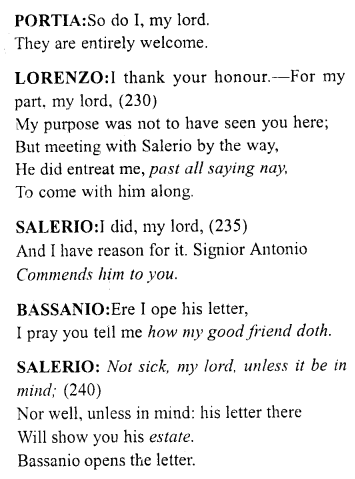
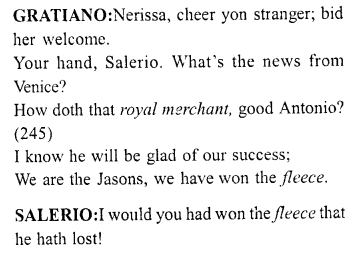
Modern English Reading
PORTIA : So do I, my lord; they are entirely welcome.
LORENZO : I thank you, sir. For my part, my lord, I didn’t intend to see you here; But, meeting with Salanio by the way, he begged me, past all saying no, to come along with him.
SALERIO : I did, my lord, and I have reason for it. Mr. Antonio send you his regards.
BASSANIO : Before I open his letter, please tell me how my good friend is doing.
SALERIO : He’s not sick, my lord, unless it’s in his mind; but he’s not well, unless in his mind; his letter there will show you his state of affairs.
Bassanio opens the letter.
GRATIANO : Nerissa, cheer the stranger; say hello to her. Let me shake your hand, Salanio. What’s the news from Venice? How is that royal merchant, good Antonio?I know he will be happy at our success: We are the Jasons, we have won the fleece.
SALERIO : I wish you had won the fleece that he has lost.
Word Meaning With Annotation
Past all saying nay : in spite of all arguments to the contrary, commends him to you : sends his compliments, how my good friend doth : simply “how he is,” like the modem inquiry after a friend’s health: “How do you do?” not sick, my lord, unless it be in mind : he has no illness unless it be mental trouble. On the other hand, he can have no cause for happiness, except in his mind, estate : condition. Royal merchant : a very important merchant. We speak of “merchant princes,” meaning very great men of business, fleece : wealth, fleece : here signifies “wealth.” A sheep’s riches consists of the fleece on its back.
Original Text
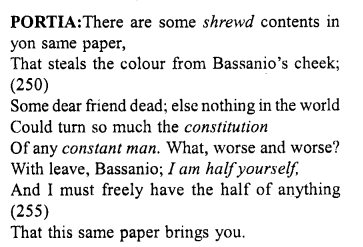
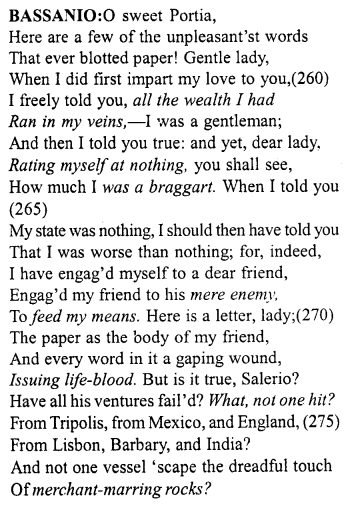
Modern English Reading
PORTIA : There are some harsh contents in that letter that steal the color from Bassanio’s cheeks: Some dear friend is dead, or nothing else in the world could change the constitution so much of any constant man. What, worse and worse! Please, Bassanio: I am your other half, and I must freely have the half of anything that this letter brings to you.
BASSANIO : Oh, sweet Portia! Here are a few of the most unpleasant words that were ever written on paper. Gentle lady, when I first gave my love to you, I freely told you that all the wealth that I had Ran in my veins, I was a gentleman; and then I told you the truth. And yet, dear lady, even rating myself as zero, you shall see how much I was bragging. When I told you that I had nothing, I should have told you then that I had less than nothing, because; indeed I have indebted myself to a dear friend, Indebted my friend to his notorious enemy, to feed my needs. Here is a letter, lady, the paper is like the body of my friend, and every word in it, a gaping wound Bleeding heavily. But is it true, Salanio? Have all his ventures failed? What, not one came in? From Tripolis, from Mexico, and England, From Lisbon, Barbary, and India? And not one vessel escaped the dreadful touch of the rocks that can break a merchant?
Word Meaning With Annotation
Shrewd : sharp; bitter, constitution normal condition; self-control, constant man : man of firm nerves. I am half yourself : it is proverbial that, on marriage, man and his wife are united into one; hence each can only claim to be one half, all the wealth I had, Ran in my veins : that I possessed no riches except noble blood, rating myself at nothing : when I estimated my possessions at nothing, was a braggart : I was actually boasting and over estimating, mere enemy : one who was his complete enemy, feed my means ; increase my resources, issuing life-blood : dis charging his life-blood, what, not one hit : What! Has not a single one attained its object? merchant-marring rocks : rocks, which ruin merchant by wrecking their ships.
Original Text
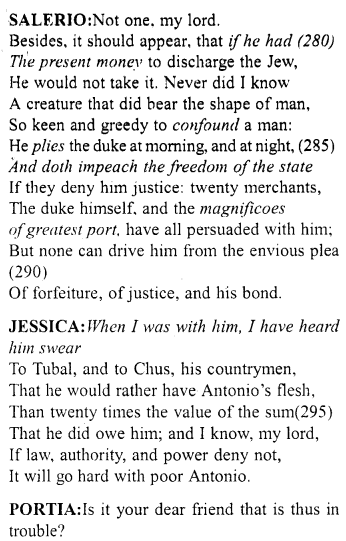
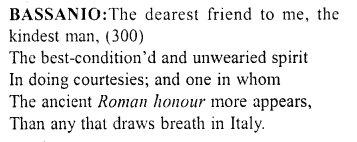
Modern English Reading
SALERIO : Not one, my lord. Besides, it seems that, even if he had the money right now to pay the Jew, he wouldn’t take it. Never did I know a creature that was shaped like a man, so eager and greedy to destroy a man completely. He petitions the Duke morning and night, and challenges the freedom of the courts, if they deny him justice. Twenty merchants, the Duke himself, and the noblemen of greatest reputation, have all tried to persuade him; but no one can drive him from the envious plea of default, of justice, and his promise to pay.
JESSICA : When I was with him, I heard him swear to Tubal and to Chus, his countrymen, that he would rather have Antonio’s flesh than twenty times the value of the sum that he owed him; and I know, my lord, If law, authority, and power, don’t deny him, It will go hard with poor Antonio.
PORTIA : Is it your dear friend that is in trouble like this?
BASSANIO : The dearest friend to me, the kindest man, the best conditioned and unwearied spirit in manners, and one in whom the ancient Roman honor appears more than any man alive in Italy.
Word Meaning With Annotation
If he had the present money : if he had the money at the present time, confound : ruin; reduce to beggary, plies : continues to approach; presses, and doth impeach the freedom of the state : to “impeach” in legal language, meant “to bring an accusation against.” Shylock brings the charge that Venice is denying him his legal rights, and therefore is violating the free rights which foreigners were supposed to enjoy, magnificoes of greatest port: the greatest nobles of Venice were termed “Magnifici”, the noble-minded or magnificent ones “Of greatest port” may be rendered as “of the most noble carriage”, when I was with him, I have heard him swear : this is an indication of the passage of time showing that Jessica is speaking of things by no means recent. It also shows Jessica’s character, and some might fancy that this betrayal of her father’s confidential talk is not an admirable trait. Roman honour : in the early days of the Roman empire the Romans were famed all over the world for the strict and un wavering code of high honour which distinguished their national life. The standard of national honour was made the theme of many a song.
Original Text
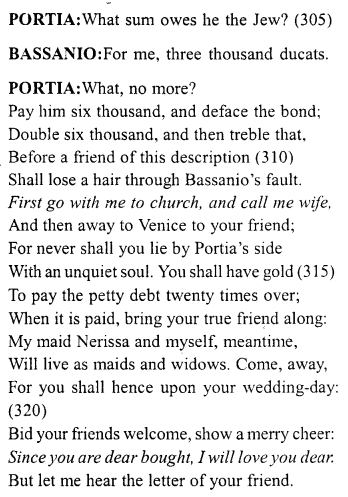
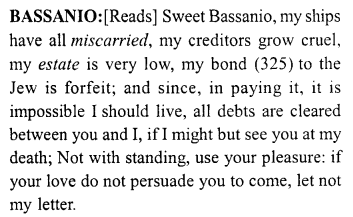
Modern English Reading
PORTIA : How much does he owe the Jew?
BASSANIO : For me, three thousand ducats.
PORTIA : What! Is that all? Pay him six thousand, and destroy the promise to pay; Double six thousand, and then treble that, before a friend of this description loses a hair because of Bassanio. First go with me to church and marry me, and then go away to Venice to your friend; because you shall never lie by Portia’s side with an uneasy soul. You shall have gold to pay the little debt twenty times over: When it is paid, bring your true friend back with you. My maid Nerissa and I will live as maids and widows in the meantime. Come, let’s go! Because you shall go away on your wedding day, Bid your friends welcome, show a happy face; Since you are bought so dearly, I’ll love you dearly. But let me hear the letter of your friend.
BASSANIO : “Sweet Bassanio, my ships have all sunk, my creditors grow cruel, my funds very low, my promise to pay to the Jew is in default; and since, in paying it, it is impossible forme to live, all debts between you and me are canceled if I might only see you at my death. Anyway, enjoy yourself; if your friendship doesn’t persuade you to come, don’t – let my letter.”
Word Meaning With Annotation
First go with me to church, and call me wife : to have the legal ceremony of marriage performed by the priest, since you are dear bought, I will love you dear : “Since you have cost your friend Antonio so dear a price, I shall hold you equally dear in my estimation.” miscarried : failed, estate : my wealth.
Original Text
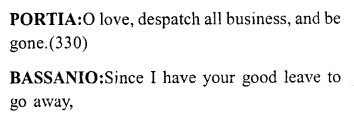
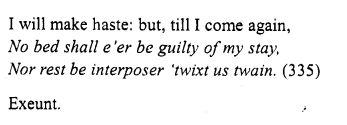
Modern English Reading
PORTIA : Oh, love, finish all business and get going!
BASSANIO : Since I have your permission to go, I’ll hurry; but, until I come back again, I will not sleep, and rest will not keep us two apart.
Exeunt.
Word Meaning With Annotation
No bed shall e’er be guilty of my stay : Bassanio says that since Portia is so noble and self-sacrificing as to allow him to leave her on the wedding day, he will also make some self-sacrifice. So he will not be guilty of taking comfortable rest in bed as along as he is away from her, and no rest will refresh him in the interval before he returns.
For More Resources



























